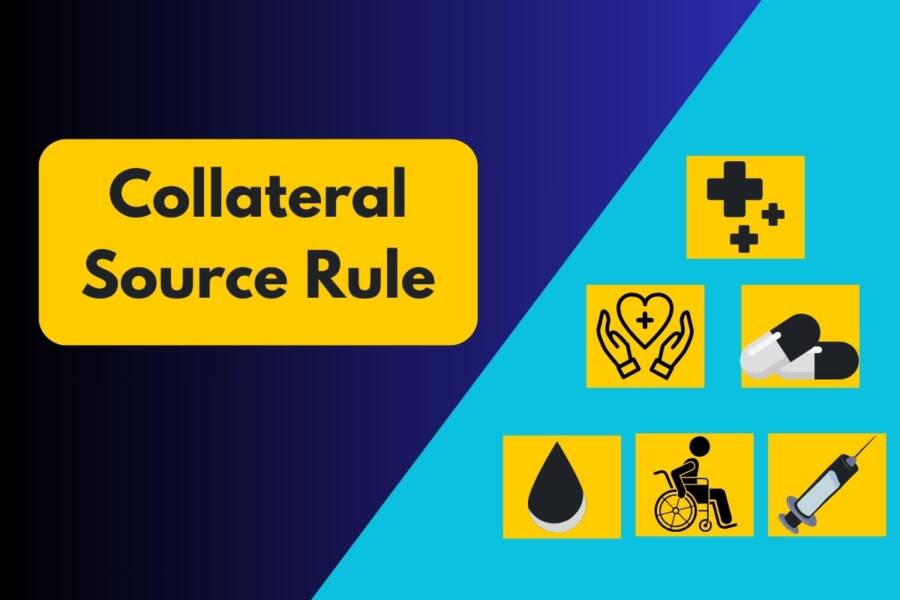business resources
A Detailed Look at the Collateral Source Rule
8 Sept 2022, 0:20 am GMT+1
Personal injury is the legal term for any harm that a third party does to you or your property. This can be in a car accident, at a workplace, or at any public place. The branch of law that deals with such injuries is called personal injury law.

The law gives US citizens the right to compensation in a personal injury case. It aims to hold people accountable for their actions and protect their rights. As the law covers a wide range of scenarios, it is advisable to hire an attorney, like the experienced personal injury lawyers at Boohoff Law, P.A., should you find yourself involved in an accident caused by someone else.
Collateral Source Rule
There are several rules and exceptions that fall under personal injury law, and the collateral source rule is one of them. It gives plaintiffs, or victims, the right to receive compensation from those who harmed them or defendants, even if an insurance company has compensated them for their injuries or losses.
The idea behind this law is to hold defendants accountable for the damage they’ve caused and not escape paying the penalty just because the victim’s insurance reimbursed them for the damages.
The law states that, while deciding how much compensation the victim is owed, the judge or jury cannot take into consideration payments made from other sources to cover the cost of injuries from the accident. This includes payments made by others or payments from insurance providers.
Other categories of compensation that fall under this law include
- Worker's compensation
- Paid time off
- Medicaid
- Social Security
Even if the victim has received benefits from any of these schemes, they are still eligible for monetary compensation from the defendant.
States have their own interpretation of the law. In Louisiana, Medicaid payments are not considered as the victim does not pay into the system. In California, if a healthcare provider is sued for medical malpractice, they may provide payments made to the victim through insurance as evidence.
However, to counter, the victim may also provide evidence of payments they made to get the insurance in the first place! This aims to introduce fairness by considering both the defendant's and the victim's perspectives.
Criticism of the collateral source rule
The collateral rule has come under heavy criticism as it allows victims to collect double pay – once from their insurance providers and again from defendants. Critics argue the need to pay a victim more than the damages they’ve incurred.
The rule may also give plaintiffs a way to file specious claims that may not be justified. It may be unfair to rule that the defendants pay compensation when the victim’s injuries are already covered by insurance.
Due to the criticism surrounding the collateral source rule, some states have moved to limit its use. This means that the payments that are accepted as collateral sources may change based on state law.
Subrogation clause for insurers
Insurance companies have added a subrogation clause to their contracts. This means that plaintiffs have to reimburse insurance companies using the compensation from defendants.
For example, a victim of a car accident had medical bills amounting to $40,000, which was paid by insurance. The defendant paid them a compensation of $60,000. The victim must now reimburse the insurance company for the $40,000 they paid.

Conclusion
The collateral source rule aims to hold defendants accountable for their actions. It protects the rights of citizens and gives them an avenue to fight for compensation. However, the law may not be required in some cases, as it gives victims double compensation for injuries. In order to understand the specifics of your case and if the collateral law applies to you, consult a personal injury lawyer.
Share this
Contributor
Staff
The team of expert contributors at Businessabc brings together a diverse range of insights and knowledge from various industries, including 4IR technologies like Artificial Intelligence, Digital Twin, Spatial Computing, Smart Cities, and from various aspects of businesses like policy, governance, cybersecurity, and innovation. Committed to delivering high-quality content, our contributors provide in-depth analysis, thought leadership, and the latest trends to keep our readers informed and ahead of the curve. Whether it's business strategy, technology, or market trends, the Businessabc Contributor team is dedicated to offering valuable perspectives that empower professionals and entrepreneurs alike.
previous
Change.org The Power of Digital Tech and Online Video for Social Impact
next
Dental Partnership Disputes that Necessitate the Expertise of a Lawyer